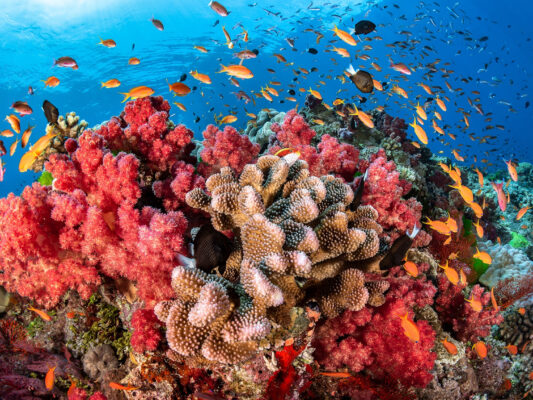With several footprints on the moon, a gaze upon the fiery surface of Venus, and a plan to study solar upper atmospheric (chromosphere and corona) dynamics, a peculiar enigma persists closer to home beneath the shimmering surface of our oceans. The cosmos has yielded to our efforts, revealing its secrets and granting us a taste of its celestial wonders. Yet, the Earth’s oceans remain largely uncharted and unprotected, veiling an unexplored realm that holds mysteries as profound and unknown as the stars.
The mesmerising allure of the ocean has captivated human imagination for centuries, its vastness and secrecy beckoning adventurers and scientists alike. Yet, despite the leaps and bounds of technological progress, the ocean continues to hold its secrets, with more than 80% remaining unexplored and unprotected. The enigma of the deep blue stretches far beyond the shimmering surface, prompting us to question why so much of this remarkable realm remains concealed from our understanding and what measures are required to safeguard its delicate ecosystems.
The Abyssal Mysteries
Beneath the sunlit waves, the ocean transforms into a realm of perpetual darkness. The depths conceal untold wonders, from vibrant bioluminescent creatures that light up the abyss to ancient and elusive species that have thrived for millennia. However, plumbing the depths is no small feat. The crushing pressures, extreme temperatures, and lack of sunlight present formidable challenges to exploration. It’s a place where only a few manned missions have ventured, and the vast majority of our knowledge is derived from remote-operated vehicles and deep-sea probes.
Technological Barriers
The ocean’s intricate web of ecosystems spans from coral reefs to deep-sea hydrothermal vents. Yet, the unyielding depths have thwarted human attempts to study and understand them fully. Technological limitations, including the need for advanced equipment that can withstand immense pressure, have restricted our access to these ecosystems. Moreover, the cost of developing, deploying, and maintaining such equipment often hinders extensive exploration efforts.
The Bounties and Hazards
One might wonder why it’s so vital to explore and protect the unseen corners of the ocean. Beyond its aesthetic and scientific value, the ocean holds untapped resources that could potentially alleviate pressing global issues. Deep-sea minerals, for instance, could provide alternatives to dwindling terrestrial resources. However, hasty exploitation without proper understanding can lead to irreversible damage. The potential hazards of deep-sea mining, for example, underscore the importance of first comprehending the intricacies of these ecosystems.

The Fragile Balance
The ocean functions as a complex interplay of ecosystems, each dependent on the other. Disturbances in one area can send ripples of disruption throughout the entire system. Coral reefs, often called the rainforests of the sea, provide habitats for a diverse array of species. These reefs, however, are extremely sensitive to climate change, pollution, and overfishing. To preserve these delicate ecosystems, it’s imperative to understand their functioning and the consequences of human actions.
Protecting the Unseen
The ocean’s remoteness has, in a paradoxical twist, served as a form of protection for its hidden treasures. Yet, this protection is threatened by the very advancements that enable exploration. Human activities, including overfishing, plastic pollution, and climate change, are encroaching on the once-secluded world. Establishing marine protected areas (MPAs) is a critical step towards conserving these vulnerable ecosystems. These areas provide havens where marine life can thrive undisturbed and where scientists can study natural processes unaltered by human interference.
Collaborative Efforts
Addressing the challenges of exploring and protecting the ocean demands a global effort. Governments, scientists, environmental organisations, and industries must collaborate to fund research, develop new technologies, and establish conservation initiatives. Initiatives like the UN’s Decade of Ocean Science for Sustainable Development (2021-2030) highlight the urgency of this collaborative approach, aiming to galvanise efforts towards a more sustainable and informed relationship with the oceans.
The unexplored and unprotected expanse of the ocean is an invitation to discovery and a reminder of our responsibility as stewards of this planet. As we stand on the cusp of technological breakthroughs, we are presented with the unprecedented opportunity to reveal the mysteries that have eluded us for so long. By embarking on bold expeditions, fostering innovation, and advocating for conservation, we can ensure that the ocean’s hidden marvels remain intact for future generations to marvel at, study, and cherish.


